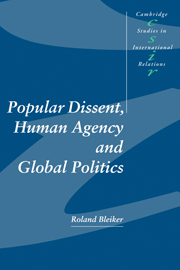Book contents
- Frontmatter
- Contents
- Acknowledgements
- Prologue: Theorising transversal dissent
- Introduction: Writing human agency after the death of God
- Part I A genealogy of popular dissent
- Part II Reading and rereading transversal struggles
- Part III Discursive terrains of dissent
- 7 Mapping everyday global resistance
- Second interlude: Towards a discursive understanding of human agency
- 8 Resistance at the edge of language games
- 9 Political boundaries, poetic transgressions
- Conclusion: The transitional contingencies of transversal politics
- Index
- CAMBRIDGE STUDIES IN INTERNATIONAL RELATIONS
Second interlude: Towards a discursive understanding of human agency
Published online by Cambridge University Press: 23 October 2009
- Frontmatter
- Contents
- Acknowledgements
- Prologue: Theorising transversal dissent
- Introduction: Writing human agency after the death of God
- Part I A genealogy of popular dissent
- Part II Reading and rereading transversal struggles
- Part III Discursive terrains of dissent
- 7 Mapping everyday global resistance
- Second interlude: Towards a discursive understanding of human agency
- 8 Resistance at the edge of language games
- 9 Political boundaries, poetic transgressions
- Conclusion: The transitional contingencies of transversal politics
- Index
- CAMBRIDGE STUDIES IN INTERNATIONAL RELATIONS
Summary
The kind of critique we need is one that can free it of its illusory pretension to define the totality of our lives as agents, without attempting the futile and ultimately self-destructing task of rejecting it altogether.
The task of articulating such a critical position on human agency towered over the entrance to this book and has never ceased to be its main puzzle, a cyclically reccurring dilemma, the issue with which each chapter had to struggle. How can we understand the processes through which transversal dissident shapes contemporary global politics? Where is this fine line between essentialism and relativism, between suffocating in the narrow grip of totalising knowledge claims and blindly roaming in a nihilistic world of absences? How to walk along this narrow path without taking a fatal step, either to the left or to the right, into a bottomless epistemological pit? How to deal with the death of God, to make a clear break with positivist forms of representing dissent without either abandoning the concept of human agency or falling back into a new form of essentialism?
We have now arrived at the point where some preliminary answers to these difficult questions are called for. A series of theoretical and practical inquiries into transversal struggles have suggested that human agency can still be exerted and conceptualised, even at a time when global politics is characterised by a multitude of increasingly complex cross-territorial interactions.
- Type
- Chapter
- Information
- Popular Dissent, Human Agency and Global Politics , pp. 208 - 214Publisher: Cambridge University PressPrint publication year: 2000



